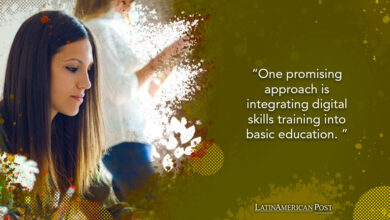So Much Data, So Little Understanding
More than half of the world's population is using new technologies and transforming their environment thanks to its potential to change their lives.

The Woman Post | María Carolina Rivero
Listen to this article
This leads to the need for skills to make better use of technologies in daily life, and to be able to adapt them to our daily activities. From its use, we can solve local and global problems, innovating and developing new economic opportunities that improve the quality of life of people. According to an article published in the Journal Telecommunications of Latin America, called "On Digital Literacy" by Cristina Cárdenas, entrepreneur in the sector of educational innovation.
On the other hand, traditional literacy remains relevant. It is also true that it is increasingly far from developing the skills demanded by new jobs and societies. According to the Organisation for Economic Co-operation and Development (OECD) by 2030, 80% of the most in-demand jobs will disappear and be replaced by jobs that do not yet exist. In addition, the OECD's most recent study on the future of work revealed that six out of ten workers lack basic skills in the use of technology, which will lead to job changes affecting some workers more than others, particularly young people with lower levels of education and women who are less likely to be underemployed and work in low-paying jobs.
Digital Literacy or Second Literacy
Illiteracy, in addition to limiting the full development of people and their participation in society, has repercussions throughout its life cycle, affecting the family environment, restricting access to the benefits of development, and hindering the enjoyment of other human rights. Countries and civil society organizations have made significant efforts to address the problem. However, the results are insufficient. In this context, and assuming the recommendations of PRELAC, ECLAC, and UNESCO's Regional Office of Education for Latin America and the Caribbean decided to develop a research project to address a new angle of the problem, incorporating cross-sectoral treatment: the costs of illiteracy for individuals and society.
Also read: CHALLENGES TO PURSUE A CAREER DURING THE PANDEMIC
The ultimate purpose is to add to ethical and political arguments in favor of literacy, those of an economic and social nature. These inputs can help strengthen literacy policies by involving new actors, such as the Treasury and Planning, making everyone's commitment to educational change a reality.
The UNESCO-Pearson Initiative for Literacy just launched their second round of case studies, examining how digital solutions can support people with low literacy or low skills to use tech in our digital world @UNESCO @pearson https://t.co/8D6RSnnEf3
— Jenny Perlman (@JennyPerlman) December 5, 2017
Literacy and Gender
Two-thirds of illiterate adults and young people are women. In some countries, this percentage reaches 80%. However, the relationship between literacy and gender is much more complex. In some middle-income countries, the community of educators has been concerned about the modest performance of males in the field of literacy. Therefore, dialectics on literacy and gender can be drastically different in different regions of the globe, a phenomenon that illustrates the importance of the context relating to the generic dimension of literacy practices and education in general, according to a publication called "The Global Literacy Challenge" of the United Nations Education Organization, Science and Culture (UNESCO).
In order to achieve equality, programs should raise awareness among people about practices, conjectures, and texts with generic biases. That is why the Mother to Mother program, which operates in the Palestinian territories, allows mothers to become familiar with the essential elements of early childhood development processes. Once the training is complete, mothers pass on their new knowledge to other mothers in the neighborhood. The program also strengthens the role of mothers in their social environment and encourages them to participate in community work.
To advance literacy as an integral part of lifelong learning and the 2030 Agenda for Sustainable Development, UNESCO takes the following approaches to promote literacy around the world, with an emphasis on young people and adults.
-Build strong foundations for early childhood education and protection.
-Providing quality basic education for all children.
-Expand functional literacy levels for young people and adults who do not have basic writing literacy skills.
-Develop literacy environments.
????In 1820, nearly 90% of the world’s population was illiterate. Today, almost 90% can read.
Literacy is associated with lower poverty & mortality rates and greater gender equality & political participation.
Read more: https://t.co/NBRRiJFNZS#78DaysOfProgress
(55/78) pic.twitter.com/7aZ3yoKBww— HumanProgress.org (@HumanProgress) May 25, 2021





